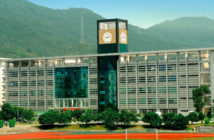It was barely 8am when I cycled past a middle school. It’s more than one hour before the first day of the gāokǎo (高考, literally “high exam”), or more formally, the National Higher Education Entrance Examination on Jun 7 (Thursday), but there were already crowds of anxious-looking parents and students outside the school gate, which was safeguarded by a dozen policemen standing behind a warning line.
Almost instinctively, I could still feel the nervousness and pressure when I took the exam, even after almost a decade.
Every year in early June, the two-day gaokao grabs the headlines of various news outlets as well as social media, much as a national event on a par with a public holiday. Does the gaokao really matter as much as many people believe?
The gaokao is the Chinese equivalent of the American SAT and British A-Levels. Statistics from a gaokao-oriented website show that there are 63,073 Beijing students signed up for the exam this year, or 2,435 more than in 2017. There are 91 schools designated as gaokao sites, mostly located in the Haidian, Xicheng, and Dongcheng districts.
The Chinese exam brings much more pressure to students compared to its American and British test counterparts, since achieving a three-digit score is the only decisive factor that determines what university local takers end up at.
Chinese universities are roughly divided into first, second, and third tiers, with the first listing those “211 Universities” and “985 Universities”, two projects initiated by authorities to promote the development of higher-level universities in the Chinese higher education system. These schools demand competitively high scores but still are highly chased because a certificate from one of them is supposed to promise better career prospects for graduates.
I scored significantly lower than my parents expected at the gaokao, sadly ending up at a third-tier university. But I don’t think that that once-in-a-lifetime exam really determined who I am, who I will be, and what I can do in my life.
On Zhihu, the Chinese equivalent of Quora, the question “What influence do you think gaokao has had on you?”, garnered more than 250,000 views and a few hundred netizens voicing opinions based on their own experience. To my surprise, most of them hold quite positive attitudes towards it.
“As an exam that involves big decisions,” one said, “the gaokao is a threshold in life indeed, but being in a good university is not a warranty card for your future success. What efforts you put during your college matters more.”
People’s Daily reported that gaokao sites in the following areas and districts will be staffed with traffic police, and sounding horns will be forbidden to ensure a distraction-free exam environment for the students:
– Guangqumenqiao, Southeast Second Ring Road area (Dongcheng District)
– Guangqiao, Chongwenmen Waidajie, Ping’an Dajie (Xicheng District)
– Erlong Avenue, Wangjing (Chaoyang district)
– Zhongguancun, Wangquanhe Road area (Haidian District)
Traffic authorities also remind the public that those areas are very likely to see traffic congestion at times before and after the exam (7-9am, 11.30am-1pm, 2-3pm, 4.30-6pm).
Photo: Pixabay




